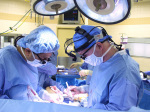Needs of Patients begin to Outpace Doctors
by
Michael Johns, Project Manager | June 06, 2006

As reported in the Los Angeles Times:
A national healthcare crisis is looming due to a shortage of doctors which will further limit access to physicians, jeopardize quality, and accelerate cost increases.
Shortages in at least a dozen physician specialties, including cardiology, radiology, and several pediatric and surgical subspecialties will be faced by patients across the country. Twelve states, including California, Texas and Florida, are already reporting physician shortages. The shortages creates pressure for medical schools to boost enrollment, for lawmakers to lift caps on funding for physician training, and to ease limits on immigration of foreign physicians, who already comprise 25% of the white-coated workforce.
However, with the long time needed to train specialists like surgeons, access to healthcare for the next decade may be affected, experts say. "People are waiting weeks for appointments; emergency departments have lines out the door," said Phil Miller, a spokesman for Merritt, Hawkins & Associates, a national physician search firm. "Doctors are working longer hours than they want. They are having a hard time taking vacations, a hard time getting their patients in to specialists."
Anneliese Ohler, a California resident, who had a cancerous lesion removed from her face several years ago, waited two months recently to see a dermatologist after her hairdresser -- and her primary doctor -- told her they saw worrisome spots on the top of her head.
"I was lucky it was not cancer," said Ohler, 83. "But what if it had been?"
While the number of medical school graduates has remained flat for a quarter-century, because schools were concerned about producing too many doctors, demand has exploded. Population gains, a healthy economy and a technology-driven boom in physicians' repertoires, like joint replacement and liposuction, have all contributed to the demand.
Aging baby boomers will push urologists, geriatricians and other physicians into overdrive over the next 15 years. One study found, cloudy eyes alone could boost the demand for cataract surgery by 47% while the physician workforce is headed for the door. One third of the nation's 750,000 active post-residency physicians are older than 55 and likely to retire as the boomer generation moves into its time of greatest medical need.
By 2020, physicians are expected to retire at a rate of 22,000 a year, up from 9,000 in 2000. That is only slightly less than the number of doctors who completed their training last year.
